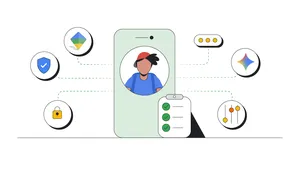Prigozhin interests and Russian information operations
One of Threat Analysis Group’s (TAG) missions is to understand and disrupt coordinated information operations (IO) threat actors. Our research enables Google teams to make enforcement decisions backed by rigorous analysis. TAG’s investigations do not focus on making judgements about the content on Google platforms, but rather examining technical signals, heuristics, and behavioral patterns to make an assessment that activity is coordinated inauthentic behavior.
In this post, TAG is highlighting four case studies involving Russian IO tied to the Internet Research Agency (IRA) and its financier, Russian oligarch Yevgeny Prigozhin. In several cases, those campaigns served the dual purpose of promoting Russia’s agenda and Prigozhin’s business interests.
These examples underline broader trends we’re seeing: Russian IO groups are increasingly obscuring their role in influence operations, relying on stronger operational security and cutouts (intermediaries to mask their work) to dissociate themselves from user-facing activity. They launder their messages via local media brands, NGOs and PR firms that were in fact created by Russian shell companies. And in some cases, IRA-affiliated actors have responded to platforms’ enforcement efforts by moving to more permissive online spaces and platforms.
IO amplifying Prigozhin’s pro-Russian films
Prigozhin has financed several movies through a partial ownership stake in the film company, Aurum LLC. The company’s movies show Russia — especially the Russian military and mercenaries — in a positive light. The films have high production values and fictionalize Russia’s actions abroad in the style of Hollywood action movies. Storylines in the films include depictions of Russian soldiers in the Central African Republic, soldiers defending native Russians in Ukraine, and even a satire about the IRA and its role in the 2016 US elections. In 2021, they released “Солнцепёк” (“Sunlight” or “Blazing Sun” in English), which takes place in eastern Ukraine and claims to be a story based on true events from 2014 of Russian mercenaries, connected to the paramilitary Wagner Group, protecting Russians in Ukraine against Ukrainian forces.
Shortly after Russia’s invasion of Ukraine, TAG identified several IRA-affiliated news sites hosting ads to drive traffic to the videos including sites like newinform[.]com and slovodel[.]com. While the film was an older release from 2021, the timing of this campaign was notable because the subject matter mirrored newly topical real world events in Ukraine in a way that portrayed Russia positively. Google terminated nine new IRA-linked accounts using Ads to advertise the film and 44 new IRA-linked YouTube channels hosting clips, the full-length film and related comments. Some accounts claimed to be officially affiliated with the film, while others presented themselves as fan accounts.
Advertisement for the movie “Sunlight” on an IRA-affiliated news site

IRA-linked IO campaigns in Africa
In recent years, Russian IO actors tied to Prigozhin and the IRA, have peddled influence campaigns promoting the interests of Russia and Prigozhin’s Wagner Group in Africa. Researchers at Stanford, Graphika, and our colleagues at Meta have documented this trend going back to 2019. These campaigns involved creating NGOs, media brands and news agencies across Africa including a Ghanaian NGO, Sudan Daily, Peace Data and SADC News. These entities presented themselves as independent non-profit organizations and recruited local journalists and subject matter experts to publish content on topics like pro-Russia narratives, African pride and empowerment, and stories suggesting that Western imperialism is destroying Africa. Some authors likely did not realize they were working for a Russia-backed IO and genuinely believed in the content they wrote.
TAG’s investigations align with these earlier findings. Google terminated accounts and channels associated with the IRA’s fake media brands and NGOs throughout 2019 and 2020. This included IRA-linked accounts using Gmail to create profiles on non-Google social platforms, creating YouTube channels affiliated with the so-called news brands, and publishing content to Blogger.
In March 2021, Google shut down activity by several IRA-linked actors who published content promoting Wagner’s operations in Africa along with pro-Russia narratives. These articles appeared on Blogger and a number of non-Google blogging platforms such as Balalaika, Hashtap, Technowar and Voskhodinfo. The blogs amplified false narratives that the United Nations is funding terrorists in the Central African Republic and that Syrians need Wagner protection. The blogs were not backed by a social media presence.
Example of a blog posted by an IRA-affiliated account

Example of a blog posted by an IRA-affiliated account

In September 2022 Google terminated three IRA-linked YouTube channels that were sharing content in French and supportive of Russian policy objectives in Libya, including promoting a film in the Shugaley trilogy, another Aurum LLC film.
IRA influence operations concerning Ukraine
Russia’s agenda in Ukraine has also been a consistent, but not overwhelming, focal point for IRA-linked influence campaigns. In February 2022, Google terminated five YouTube channels and 21 Blogger blogs posting coordinated narratives on Blogger, YouTube and the Ukrainian blogging platform, Hashtap. In addition to domestically-focused content about Russia, several of the narratives focused on maligning Ukraine. These included allegations of Ukrainians deceiving Europe and stories of how Kyiv authorities failed to properly handle the Covid-19 pandemic. This activity spanned multiple blogging platforms and TAG observed the same IRA-linked accounts posted similar commentary across various news sites.
IRA-created blog on Blogger criticizing EU support for Ukraine

IRA IO targeting domestic Russian audiences
Google regularly disrupts activity by IRA-linked accounts targeting Russian domestic audiences. These are often clusters of related accounts that create YouTube channels, upload videos, and comment and upvote each other’s videos. The activity occurs during Russian work hours, with narratives focused on Russian domestic issues and typically targeting political dissidents. In October 2022, Google terminated a cluster of nearly 700 IRA-linked accounts that were posting YouTube Shorts. The Shorts were crafted for a Russian domestic audience, praising Russian soldiers in Ukraine, and had negligible views or subscribers.
Other campaigns have focused on blogs. In July 2021, Google terminated 28 Blogger blogs created by IRA-linked accounts. Narratives in the blogs focused on Russian domestic affairs, including stories dismissing protests supporting anti-corruption activist, Alexei Navalny, denigrating local opposition politicians, criticizing the mayor of St. Petersburg and praising the heroics of Wagner Group. IRA actors also mirrored the same content on Ukrainian blogging platform, Hashtap. In some cases, multiple Blogger profiles published very similar or near-identical content.
The evolution of the Russian IO landscape
These case studies underscore several developments TAG observes in Russian IO activity. The accounts created lack well-developed, and backstopped personas, and increasingly are disrupted before they can gain traction. Russian IO actors also increasingly obscure their role, using stronger operational security and a range of intermediaries to conduct the actual user-facing activity. These proxies include third party PR firms, marketing agents, or unknowing local journalists and creators. Using well-selected proxies launders their legitimacy, and this provides an advantage compared to creating direct personas with little reach.
In our investigations of IRA-backed IO, we have also noted several cases where the narratives pushed by the IRA serve a dual purpose. Not only do they amplify messages supporting Russia, they also promote the business interests of oligarch, Yevgeny Prigozhin. Prigozhin has organized his empire around projects that directly and indirectly support the Russian state, and as the main financier of the IRA, he has cleverly leveraged his IO apparatus to amplify narratives that benefit not only Russia, but his own business interests as well.




